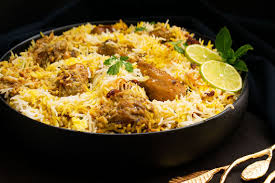A religious food Journey
Food holds a special place in Islamic culture, blending rich traditions, historical influences, and a diverse array of flavors that span across regions and communities. From hearty dishes to sweet delicacies, the Islamic world offers an exquisite culinary panorama that reflects its cultural heritage and religious significance. Here, we explore some of the best foods celebrated in Islamic traditions, inviting you to embark on a delightful gastronomic journey.
One of the most revered aspects of Islamic cuisine is the emphasis on halal dietary laws. Halal, meaning “permissible” in Arabic, refers to foods and drink that are allowed for consumption according to Islamic law. This principle shapes not only the selection of ingredients but also influences cooking methods, ensuring sanctity and mindfulness in the preparation of meals.
Traditional Dishes

Biryani
Originating from the Indian subcontinent, biryani has become a beloved dish in many Muslim communities across the world. Its aromatic rice, fragrant spices, and tender meat create a symphony of flavors that is hard to resist. Whether it’s the Hyderabadi biryani, known for its layered method of preparation, or the Kashmiri version featuring dried fruits and saffron, each variation tells a unique story of its origin.

Kebabs
Kebabs, grilled or skewered meat dishes, are a staple in Islamic cuisine. They come in countless varieties, each infused with regional spices and cooking techniques. Whether savoring the succulent shish kebab from the Middle East or the spicy seekh kebab from South Asia, these meat delicacies embody a rich history of hospitality, often served at gatherings and celebrations.
Fresh Fare

Falafel
For those who appreciate plant-based options, falafel stands out as an iconic dish. These deep-fried balls made from ground chickpeas or fava beans are often served in pita bread alongside fresh vegetables and tahini sauce. Not only is falafel delicious, but it also reflects the principles of Islamic hospitality, often making an appearance at community iftars during Ramadan.

Tabouli
This refreshing salad, made primarily from parsley, bulgur wheat, tomatoes, and lemon juice, is rich in nutrients and embodies the essence of Mediterranean flavors. Tabouli is frequently offered at meals and gatherings, showcasing the importance of fresh ingredients in Islamic cuisine.
Sweet Treats

Baklava
No exploration of Islamic cuisine would be complete without mentioning baklava. This decadent pastry, layered with nuts and sweetened with honey or syrup, is a favorite during celebrations and special occasions. Originating from the Ottoman Empire, baklava’s sweet, flaky goodness transcends borders and cultures, often served with coffee or tea.

Dates
Dates are more than just a sweet treat; they have significant religious value in Islamic tradition. Consumed during Ramadan to break fast, dates are not only delicious but also rich in nutrients. They are a symbol of hospitality and are often gifted during festive occasions.
Conclusion
Islamic cuisine encompasses a rich tapestry of flavors and dishes, each reflecting its cultural origins and traditions. Whether you’re enjoying a plate of biryani, indulging in sweet baklava, or savoring the warmth of freshly made kebabs, each bite offers a glimpse into the heart of this diverse culinary world. Embracing this richness can enhance our understanding and appreciation of a culture that thrives on sharing good food and warm hospitality. Exploring these dishes not only tantalizes the taste buds but also fosters connections among people, bridging communities through the universal language of food.
Name: Abul Bashar
